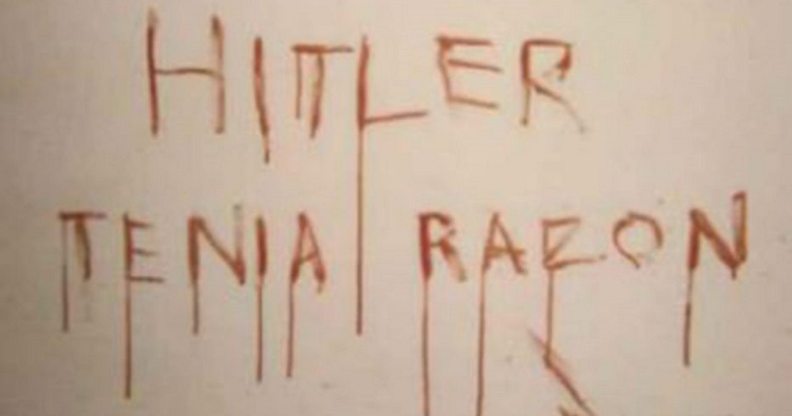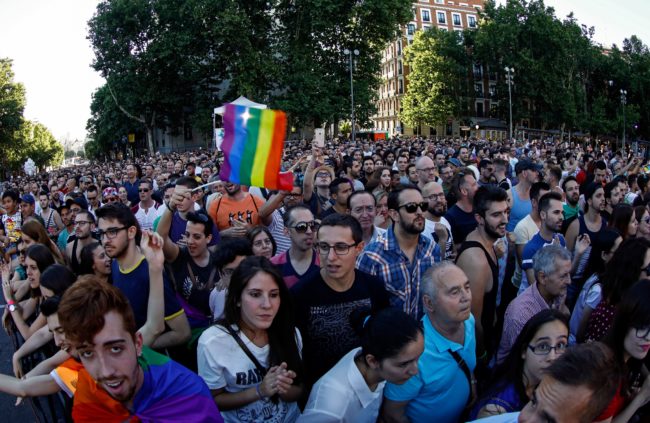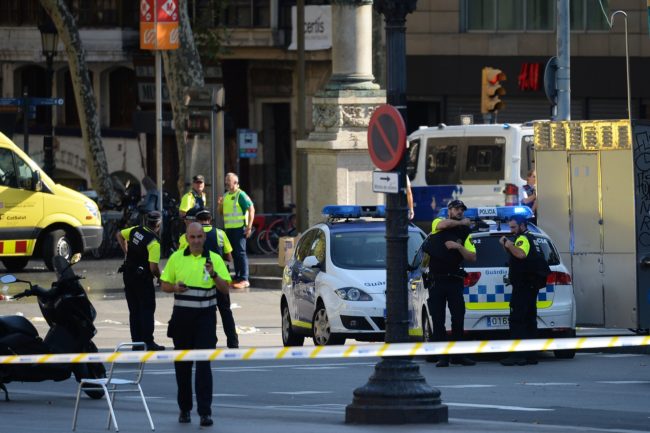An anti-gay killer who wrote a pro-Hitler message in his victim’s blood has been captured

A man suspected of killing a gay man before using his blood to write “Hitler was right” on the wall of his home has been arrested.
Spanish police have been searching for the man, who was finally captured in Colombia yesterday, for 18 years.
In March 2000, the victim – a 45-year-old gay man identified as Vitervo AV – met up with his killer after they connected through a posting in a local newspaper in Barcelona.

(Getty)
They went for drinks, before Vitervo and his date went back to a flat which belonged to an elderly man in Vitervo’s care, according to El Pais.
The victim, who came from Ecuador, was found hours later by the elderly man’s son, stabbed to death and lying naked in a pool of blood, with a yellow plastic flower wrapped around his ear.
On the wall of the flat, written in the victim’s blood, were the messages “Hitler tenia razon” – meaning ‘Hitler was right” – and “KKK,” apparently in a reference to the American hate group Ku Klux Klan.
After killing Vitervo, the suspect cleaned up his footprints and any DNA evidence he may have left before exiting the flat, authorities said.
It was three years later when police received a breakthrough in the stalled case, when a mystery person called the victim’s cousin and got her to listen to a recording of the slaying.

Participants wave rainbow flags during the LGBT Pride parade in Barcelona on July 8, 2017. (PAU BARRENA/AFP/Getty)
The cousin said she had heard what seemed to be Vitervo’s voice pleading with his killer not to murder him.
She also told authorities that she discovered flowers on her cousin’s grave which none of her relatives had left.
Attempts by the police to investigate the call revealed apparent connections to drug trafficking, but nothing more about the killing.
The case remained closed until 2016, when a judge ordered that it be reopened with a focus on several people who were connected to trafficking.
During that investigation, authorities started to concentrate their efforts on a man who had been accused multiple times of sexual aggression and who had left Spain in 2009 to move back to his native Colombia.
Officials reported that the suspect had a history of going out for drinks with someone before threatening them with a knife – just like the killer. One accuser said that she pleaded for her life while he was attacking her.
Police then tracked the man through the phone number used by the victim to call a number in a sex advert in the local paper four days before the murder.
It was then revealed that the suspect had been a soldier in Colombia and had enlisted to serve in the Spanish army for a year.
Authorities learned from those who knew him that the suspect believed in Nazi ideology and bragged about killing a gay person in Barcelona.
The suspect is awaiting extradition to Spain to face trial.
Last year, a van hit crowds of people in the Ramblas tourist area of Barcelona. Spanish officials treated the incident as a terrorist attack.

Police after the terror attack at Las Ramblas in Barcelona (JOSEP LAGO/AFP/Getty Images)
The incident came at the height of the city’s circuit season, with tens of thousands of gay men holidaying in the city.
In 2014, a report showed that anti-LGBT incidents made up almost 40 percent of all hate crimes in Spain.

